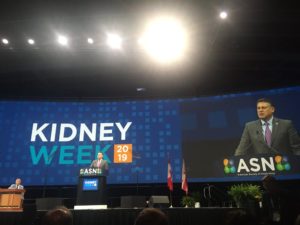
In November, as the Editor of BMC Nephrology, I had the pleasure of attending the Kidney Week Annual Meeting. Organized by the American Society of Nephrology (ASN). The four-day meeting was attended by more than 14,000 international delegates and hosted at the vast Walter E. Washington Convention Center in downtown Washington D.C.

Kidney Week began with 10 early programs, followed by an Annual Meeting that was packed with plenary talks, clinical sessions, educational symposia, and poster sessions. Organized around the sessions were meetings with BMC Nephrology Editorial Board Members who kindly agreed to meet with me.
Each day started with a series of state-of-the-art lectures including:
- Prof. Jennifer Doudna, University of California, Berkeley, on “Rewriting the code of life: the future of genome editing”
- Nobel Prize Laureate Prof. Michael Young, Rockefeller University, on “Genes controlling sleep and circadian rhythms”
- Segway™ inventor Dean Kamen (DEKA Research & Development Corp.) and nephrologists Dr. Bruce Culleton (CVS Health), and Dr. Tod Ibrahim (American Society of Nephrology) on “Perspectives on innovation and transformation in kidney care”
- Dr. Danielle Ofri, NYU School of Medicine, on “What patients say, what doctors hear”
The daily programs were crammed with cutting-edge research covering all areas of nephrology and its crossovers with other areas of medicine. Here are some of my highlights.
State-of-the-art lecture: Innovation and Transformation in Kidney Care

“Seventy-six years later, we carry a more powerful computer in our pocket, yet mostly rely on the same technology to treat kidney failure in in-center dialysis” – Tod Ibrahim
A highlight was the state-of-the-art lecture from inventor Dean Kamen and nephrologists Dr. Bruce Culleton and Dr. Tod Ibrahim, who contextualized the issue of poor health outcomes experienced globally by more than 850 million renal patients; racial inequalities in access to home dialysis; and the discard of usable kidney allografts while patients are dying on transplant waiting lists. Progress to resolve these issues in the field seems to have stalled, with Ibrahim naming underfunding from the government and investors as a contributor.
However, the overall feeling was optimistic. The speakers were enthusiastic about how technology could revolutionize future nephrology care, and how initiatives such as Advancing American Kidney Health could help bring investment into future technologies. Furthermore, the setup of the US Advanced Regenerative Manufacturing Institute has brought the development of a system to induce pluripotent stem cells to generate segments of bone and ligament within 40 days. This begs the question: how can this area of developmental biology influence the manufacture of kidneys and other organs for transplantation?
Clinical Practice Session: Pregnancy Outcomes and Kidney Disease

I attended BMC Nephrology Section Editor, Dr. Giorgina Piccoli‘s (University of Torino, Italy) talk on ‘Reproductive health in women with chronic kidney disease and kidney transplantation’. The risks that women experiencing kidney disease face are worrying, with patients on dialysis and with chronic kidney disease at higher risk of experiencing pre-eclampsia and premature parturition, amongst other risks, compared to the rest of the population. However, it was encouraging and inspiring to hear how Dr. Piccoli approaches these kinds of scenarios and how she values contraception and sexual health counseling and open communication with her female patients, to understand her patient’s wants and needs. Dr. Michelle Hladunewich, Sunnybrook Research Institute, Canada, offered a positive outlook for the future for women on dialysis who hoped for a successful pregnancy. Dr. Hladunewich explained that when a patient falls pregnant whilst being treated with dialysis, the risk of premature delivery can be lowered with certain interventions such as careful attention to clearance rates and induction of labor. With Canada being one of the world’s leaders in live birth rates for women on hemodialysis, perhaps there are some important lessons to be learned here?
ASN’s next Kidney Week meeting will take place in Denver, Colorado on the 20th-25th October 2020. The BMC Nephrology team certainly look forward to attending future Kidney Week meetings.

Comments